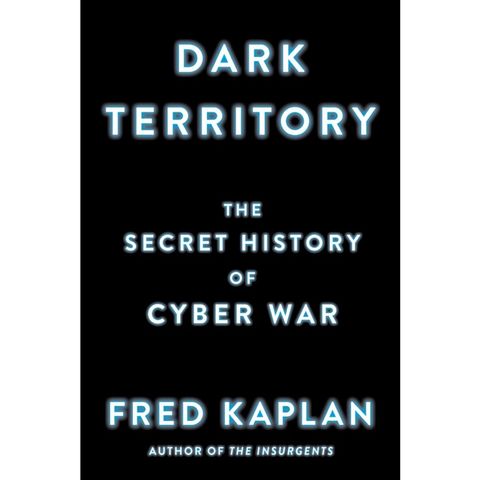Fred Kaplan The Secret History Of Cyber War
10 de mar. de 2016 ·
21m 30s

Descarga y escucha en cualquier lugar
Descarga tus episodios favoritos y disfrútalos, ¡dondequiera que estés! Regístrate o inicia sesión ahora para acceder a la escucha sin conexión.
Descripción
For all the headlines about cyber warfare as a new type of conflict, few realize that it in fact dates back nearly 50 years, to the birth of the Internet....
mostra más
For all the headlines about cyber warfare as a new type of conflict, few realize that it in fact dates back nearly 50 years, to the birth of the Internet. And while most news stories on cyber attacks focus on Russia, China, North Korea, and Iran, the first and still most serious hacks were mounted—and the first ideas about cyber war were conceived—by the United States.
In DARK TERRITORY: The Secret History of Cyber War (March 1, 2016/$28.00 hardcover), Pulitzer Prize-winning journalist and New York Times best-selling author Fred Kaplan probes the inner corridors of the National Security Agency, the beyond-top-secret cyber units in the Pentagon, the “information warfare” squads of the military services, and the national security debates inside the White House, to tell the story of the officials, officers, scientists, and spies who devised this new form of conflict and who have been planning—and, more than most people know, fighting—these kinds of wars for decades.
Kaplan reveals the never-before-told story of the computer scientists and policymakers who invented—and now explore, exploit, and worry about—cyber war, which has spawned the world’s fastest-growing, most mysterious sector of military activity. Kaplan shows that this “new” kind of war actually has a long secret history, stretching back to the birth of the Internet, in the late 1960s, involving an entire community of technologists and spies, mainly in the National Security Agency, the Air Force Information Warfare Center, the Navy cryptology departments, and a special-access bureau within the Pentagon’s Joint Staff called J-39.
Drawing on little-known documents and exclusive interviews with more than 100 participants in the story (ranging from cabinet secretaries, generals, and admirals—including six NSA directors—to midlevel officials and analysts, to technical wizards in the secret labs of the national-security bureaucracy), Kaplan delivers many news-making revelations, including the role that “information warfare” has played in tilting the outcomes of conflicts in Haiti, Serbia, Syria, the former Soviet republics, Iraq, and Iran.
Spanning half a century, DARK TERRITORY also shines an unsettling light on our future. The cyber era allows almost every country to become a cyber war power, with the ability to disable critical infrastructure around the world with lightning speed. Ironically, Kaplan argues, this leaves America—the innovator and most technologically advanced country in the art and science of cyber war—most vulnerable of all, because we are the most advanced, the most immersed in a matrix of computer networks, which are all vulnerable. With all the resources at our disposal, the U.S. still has no effective defense against a determined cyber attack.
mostra menos
In DARK TERRITORY: The Secret History of Cyber War (March 1, 2016/$28.00 hardcover), Pulitzer Prize-winning journalist and New York Times best-selling author Fred Kaplan probes the inner corridors of the National Security Agency, the beyond-top-secret cyber units in the Pentagon, the “information warfare” squads of the military services, and the national security debates inside the White House, to tell the story of the officials, officers, scientists, and spies who devised this new form of conflict and who have been planning—and, more than most people know, fighting—these kinds of wars for decades.
Kaplan reveals the never-before-told story of the computer scientists and policymakers who invented—and now explore, exploit, and worry about—cyber war, which has spawned the world’s fastest-growing, most mysterious sector of military activity. Kaplan shows that this “new” kind of war actually has a long secret history, stretching back to the birth of the Internet, in the late 1960s, involving an entire community of technologists and spies, mainly in the National Security Agency, the Air Force Information Warfare Center, the Navy cryptology departments, and a special-access bureau within the Pentagon’s Joint Staff called J-39.
Drawing on little-known documents and exclusive interviews with more than 100 participants in the story (ranging from cabinet secretaries, generals, and admirals—including six NSA directors—to midlevel officials and analysts, to technical wizards in the secret labs of the national-security bureaucracy), Kaplan delivers many news-making revelations, including the role that “information warfare” has played in tilting the outcomes of conflicts in Haiti, Serbia, Syria, the former Soviet republics, Iraq, and Iran.
Spanning half a century, DARK TERRITORY also shines an unsettling light on our future. The cyber era allows almost every country to become a cyber war power, with the ability to disable critical infrastructure around the world with lightning speed. Ironically, Kaplan argues, this leaves America—the innovator and most technologically advanced country in the art and science of cyber war—most vulnerable of all, because we are the most advanced, the most immersed in a matrix of computer networks, which are all vulnerable. With all the resources at our disposal, the U.S. still has no effective defense against a determined cyber attack.
Información
| Autor | Arroe Collins |
| Organización | Arroe Collins |
| Página web | - |
| Etiquetas |
Copyright 2024 - Spreaker Inc. an iHeartMedia Company
